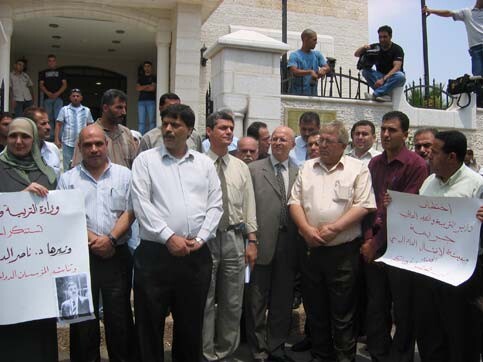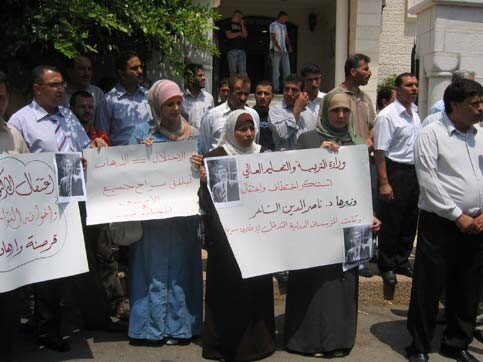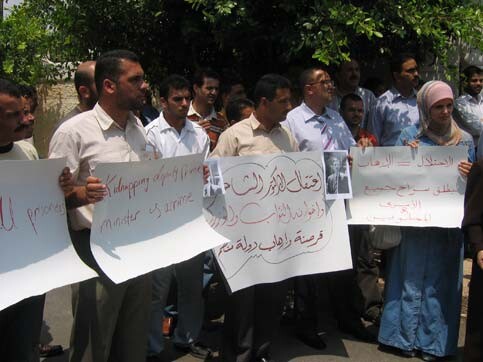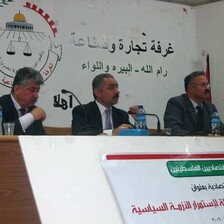The Electronic Intifada 25 August 2006

Palestinians protest on August 19, 2006 in front of the Council of Ministers Building against the kidnapping and detention of the Minister of Education. (Rima Merriman)
In a couple of weeks, Palestinian children will start the school year - maybe. The Palestinian Authority (PA) Minister of Education, Dr. Nasser Al Shaer, was abducted by the Israeli army a few days ago and is in prison. Teachers and administrators have not been paid for months as a result of Israel’s withholding of tax revenues. As many as five PA ministers are in Israeli prisons currently, as is a third of the members of the Palestinian Legislative Council, including its speaker.
Having successfully created this vacuum in Palestinian “authority” (unfortunately aided and abetted by the international community), Israel also refuses to accept its legal obligation as an occupying power to provide services for the people it is occupying.

Palestinians protest on August 19, 2006 in front of the Council of Ministers Building against the kidnapping and detention of the Minister of Education. (Rima Merriman)
The Palestinian population in the occupied Palestinian territory (oPt) is now thoroughly besieged, contained, infiltrated, sectioned off, isolated, locked up, controlled and manipulated by Israel. Destruction of infrastructures, incursions, withholding of tax revenues, the wall, confiscation of land, expansion of settlements, restriction of movement of goods and people, home destructions - i t’s hard even to count all the ways of Israel’s overwhelming exercise of power in the oPt. The Israeli army’s sustained killings of Palestinians - at least 188 in July, mostly in Gaza, a third of whom were women and children - and the stamping out of all means of resistance are more ferocious than ever. The economic pressure is spawning discontent and disunity. People, as scripted, are increasingly turning on one another like caged rats that have gone hungry for too long.
In both Gaza and the West Bank, Palestinian armed resistance is blocked at every turn. Little is left beside crude, home-made weapons that, more often than not, blow up in the fighters’ own faces - literally. The proposed Palestinian “national unity government” meant to appease and allay Israeli and international fears is bound to have little effect on Israel’s unilateral plans, nor, if change becomes possible, will it be able to negotiate any better than its predecessors.
The question is, has Israel, at long last, broken the will of Palestinian resistance in all its forms? And make no mistake, the Palestinian Authority is one form of resistance - at least that’s how Palestinians see it. In spite of all its failures, it is (one is tempted to say, was) a bid for liberation.

Palestinians protest on August 19, 2006 in front of the Council of Ministers Building against the kidnapping and detention of the Minister of Education. (Rima Merriman)
Certainly the situation on the ground in the oPt is bleak. Nevertheless, the rhetoric of resistance is still strong. There is always a current that will never give up.
Unlike weapons or human beings or land or homes, people’s expression of their identity, their belief in the justice of their cause and their rebellious impulses have always been hard for Israel to destroy - not that it does not try. The glorious and tragic characteristic of this rhetoric in the case of the Palestinians is that it has hardly ever matched the reality of the situation. The Palestinian flag is everywhere, even though the Palestinians have no state. The speaker of the Palestinian Legislative Council, debased and shackled by the Israelis, still loudly insists on the legitimacy of what he stands for. The Road Map negotiations the Palestinian president clings to might as well be a figment of his own imagination, but he still proclaims what the Palestinians will accept or not accept. Israeli soldiers at check points, who have taken recently to destroying mobile phones sporting Hizbollah’s Sheikh Nasrallah’s photo as screensaver, are fighting phantoms, not the Palestinian youth carrying the phones.
Hamas’s recent act of capturing the Israeli soldier (as was Hizbollah’s similar tactic) aimed at creating a bargaining chip. Israel, however, has no use for bargaining within its Alice-in-Wonderland logic of “chop off their heads”. To describe this logic, one has to echo the slogans that are now spread on Lebanese ruins: Smart bombs for stupid minds.
The recent twist in the plot, namely Hizbollah’s unexpected ability to resist the Israeli war machine, has at long last given not only Lebanon a bargaining chip, but all Arabs. The Arab League is now talking about a Saudi, Egyptian and Jordanian joint peace initiative - a plan that they intend to present to the UN Security Council - not to New York Times columnist and correspondent Thomas Friedman, out of all people, as happened with the 2002 Saudi plan. What’s more, they are talking with a certain amount of confidence this time, feeling slightly less disenfranchised from the international system.
As the Arab world, riveted, watched the UN Security Council deliberations unfold with blow-by- blow accounts and high-caliber analyses from Arab satellite TV, a whole region was being educated on how the international legal framework, at least as represented by the US dominated Security Council, works. Its clear bias in favor of Israel was hardly news, but it was breathtaking, nevertheless - incredible in the doublespeak that spewed out, in the Kissinger-style “constructive ambiguity” that finally emerged and that is guaranteed to cause future problems and more destruction. Only one side, apparently, is endowed with the “right” and legitimacy to defend itself.
Bush is now declaring self-righteously that “there must be consequences if people thumb their nose at the UN Security Council,” intending his words as a threat of war against Iran. Trouble with Supernanny is that she is inconsistent with her discipline and has zero moral credibility in the region. When was the last time that the UN was able to make Israel comply with a UN resolution that was in favor of the Arab side?
Will Palestinian children go to school in a few weeks? If not, they are sure to be learning their lessons on the streets. These won’t include the lesson that their nation does not require a state.
Rima Merriman is a Palestinian-American living in Ramallah in the occupied West Bank.
Related Links




